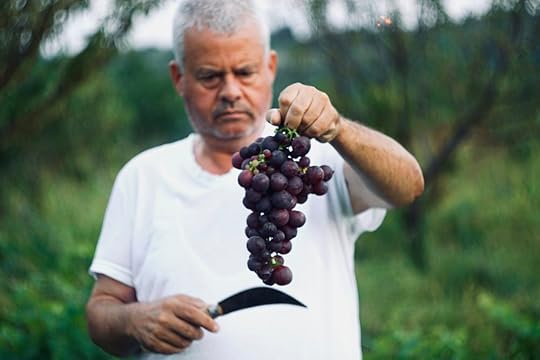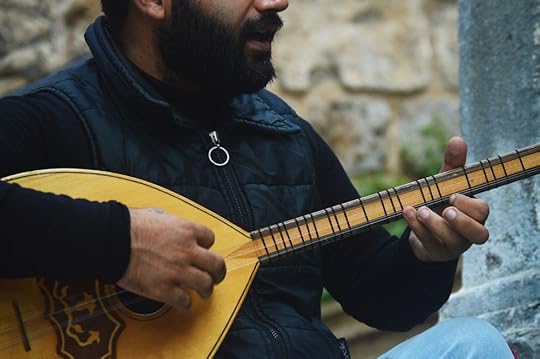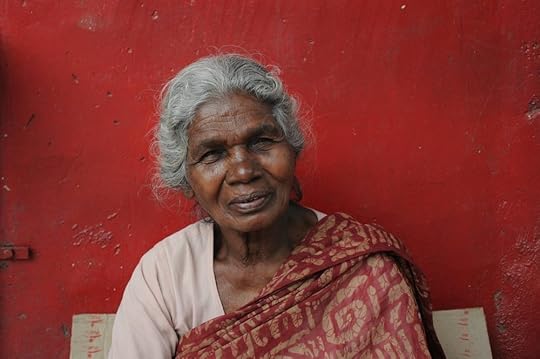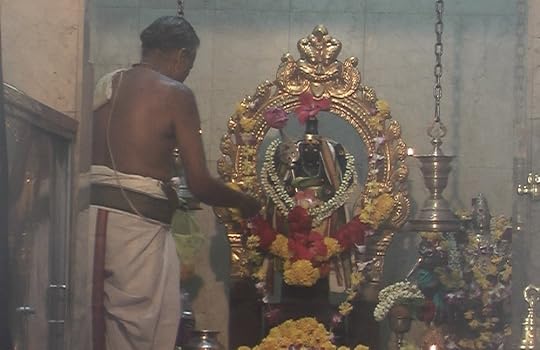Steve Addison's Blog, page 8
September 19, 2024
The Grace of Unfruitfulness

One morning Jared woke with a compelling question on his mind, “If I believe that eternity is true, and I'm going to spend endless days with Jesus, how should I live my life?”
Every morning for weeks he woke to the same question.
Finally, he answered, “Alright, If it’s true, I want to give the rest of my life to making disciples.” He just didn’t know how.
So Jared sought out training and discovered the world of movements that multiply disciples and churches. In the process, he met, fell in love and married Elle.
As a young couple, they delayed moving overseas for two years while they sharpened their skills making disciples in Austin, Texas.
Finally, they were ready to join a team in South Asia. The fulfillment of their calling.
Fast forward eighteen months and Jared has been applying everything he’d been trained in. He was doing the right things based on strong Biblical foundations and best practices. No fruit. No one was coming to faith. No one they trained was implementing. As his anxiety levels rose, it became the worst eighteen months of Jared’s life.
On a lone fourteen-hour drive Jared wept and poured out his heart to God. “Lord I gave up everything to obey your call. Why is nothing happening!”
As he drove and prayed heard God say, “Jared are you doing this for yourself, or are you doing this for me? I’m not going to share my glory with you.” He said, "Jared, you have never and will never save anyone."
God said, “Jared, why are you doing this? Are you doing this for me?”
God showed Jared his heart. God removed the idols of success and pride. He learned God is the only one that can start a movement.
Jared says, “Man, I repented on that car ride!”
“I had such an approval idol in my life that a lot of my actions and thoughts were coming out of wanting to be approved by other people that I looked up to. I had to realize that the ultimate approval I'm looking for is just from the Lord.”
I learned a lot about contentment, that contentment comes from the Lord, not from the state of the ministry or the progress as we perceive it, but staying content in the Lord. As we faced these challenges together it grew our affections not only for the Lord, but for each other. Our love and desire for one another grew.
One week after the fourteen-hour car trip we met our first guy who broke through to multiply. The next week we met the second guy. A month later we met Lydia who led fifteen people to Christ in her first week as a disciple and now has multiplied disciples and churches to the fourth generation.
In the last four years, the movement has seen over 50,000 baptisms.
Part 1: 334-The first five years.
Part 2: 335-The Last Five Years
September 17, 2024
Quality or Quantity? Fast or Slow?

I’ve just read the article on the Lausanne website on the danger of preferring speed to faithfulness in disciple making/church planting movements.
The author argues that practitioners of these movements who go after rapid multiplication are prone to pragmatism. They think they “will engineer a movement” through innovation and creativity that produce new strategies and tools.
Seeking success they honor “strategies, steps and solutions rather than mysteries, mystics and martyrs.”
The answer given to this problem is to rest in the sovereignty of God. Practitioners must learn that “God gives growth as weak heralds proclaim a foolish message, trusting in God’s sovereign timing and purposes rather than our own.” That statement is true, but it’s only half the story.
The same concern and solution were once offered to William Carey when he proposed that something be done about a lost world.
Recently I sat with five Indian movement leaders. They were not pragmatic secularists, but men of God who had all suffered for the gospel. They’d all been beaten, some had seen the inside of a jail.
They know how to map their progress and identify unreached people groups. They have strategies, methods and tools, but before all else, they are men of God’s Word, laying down their lives for the gospel.
When they and their people go into an unreached neighborhood or village, they go with an offer of prayer, the gospel and an invitation to sit and read the stories about Jesus and learn to follow him together.
They use technology when it’s helpful, Biblical and reproducible. In one movement a simple SD card loaded with audio and text Bibles and simple discipleship studies has multiplied the impact of their workers. But it’s not the SD card that is the engine room of this rapidly growing movement, it’s the Word of God carried by ordinary believers to their friends and family and people far away.
Tens of thousands have turned to Christ and are meeting in homes as a result. Is that too rapid? Well, in this movement you don’t hear the challenge to repent and believe until you have completed thirty-five studies that begin with Creation and end with Christ. That’s not rapid. But it is.
Those households who repent and believe are baptized and told their baptism, like Christ’s, is their commissioning to make disciples.
Soon they’re opening up unreached homes and villages taking households through the thirty-five studies.
It is not a “rapid” strategy if it relies on thirty-five lessons before someone repents and believes — unless 80% of the disciples are out making disciples. That’s a rapidly growing movement that relies on a slow and careful method of discipleship and church formation. There are much easier and faster ways to “save souls” in India. But these disciples are making disciples and forming new churches to the glory of God. They regard Jesus’ command to make disciples of the nations as urgent.
Here’s the point. In Acts, Luke doesn’t choose between the sovereignty of God and the part we play in God’s mission. It’s a movement of God, driven forward by the dynamic Word of God, through ordinary people. They have a mandate to go to the ends of the earth, reaching every people and every place.
So should we go for quality or quantity? For depth or breath? Fast or slow? These are false dichotomies.
What farmer wants quality OR quantity? A wise farmer works for both. He works for a high-quality crop and lots of it.
September 15, 2024
335-The Last Five Years

The first five years were hard, how did Jared adjust when the breakthroughs came?
Part One: 334-The First Five Years
September 12, 2024
334-The First Five Years

Jared’s early years in Asia were like being out fishing all night and catching nothing. What was God up to?
Part 2: 335-The Last Five Years
344-The First Five Years

Jared’s early years in Asia were like being out fishing all night and catching nothing. What was God up to?
September 10, 2024
Coffee and Persecution

We met in an upstairs room above a cafe. A handful of Indian movement leaders. Our topic was persecution: What are you experiencing? What are you learning?
I was there to listen and learn.
These leaders face opposition all the time. It’s the air they breathe. There are peaks of intensity, there are lulls, but it never goes away.
In India, there’s an anti-conversion law that forbids forcing conversions or offering incentives to change your religion. The law isn’t the problem, it’s how it is applied and the severity of sentencing. There are long jail terms if you are found guilty.
When the gospel goes into an unreached village or neighborhood it is often met with faith, discipleship and new churches. It’s also met with organized opposition from Hindu nationalists.
The pushback begins with threats and can escalate into violence. It was sobering to sit in a room with brothers who had been bruised and bloodied for the sake of the gospel. Some of their disciples have had their homes burnt down.
Sometimes police intervene but often the extremists apply pressure on the police to look the other way. They also pressure the police to prosecute under the anti-conversion laws.
The police may open an investigation. They arrest and question anyone identified as a leader. They’re looking for evidence of coercion or inducements to convert. When they don’t find anything they’ll make threats. They want agreements that the prisoner will stop proclaiming the gospel and hand over the names of those who have become disciples. They want to track the growth of the group.
Mostly there’s not enough evidence, but the investigation is the punishment, especially if it happens every time there’s a new allegation.
There are stories like this wherever the gospel is advancing.
I asked these leaders what they’ve learned as they read the Scriptures and reflected on their experiences.
They told me:
When persecution comes it’s time to humble ourselves before God, to fast and pray.
Persecution is an opportunity to bear witness faithfully to Jesus Christ.
Not everyone is against us. People are watching our responses. Often they defend us.
When the storm subsides, the fruit is new disciples and churches.
I felt a deep respect for these leaders. Surprisingly they could joke and laugh about their mistreatment. There was no fear in the room. No retreat from their calling. It was the price they paid for a nation in darkness for thousands of years to finally see the face of Jesus in the light of God’s glory.
September 8, 2024
War and Peace in the Middle East: Reflections

My writeup of the interview with James…
Mohammed was a bad Muslim from a region controlled by rival clans engaged in crime. A drug dealer for thirty years, he’d done ten years in prison for murder. In prison, he’d cried out to God to make himself known. Now released and at home, God woke him up one morning and told him to go and wait outside for his messenger.
Meanwhile a German missionary near the end of his time in the country was driving through the region, his rental car company was tracking his movements and became concerned that the car had been stolen. They knew how dangerous the region is. They remotely disabled the car and it rolled to a stop outside Mohammed’s house. Through a translator, the German shared the gospel, and Mohammed believed and was baptized.
Six months later, God connected Mohammed with James and Hope, two Americans serving in the Middle East. They met Mohammed and they met his two wives and sixteen children. One of his wives explained, “I wish you’d come earlier. Since meeting Jesus he no longer gets drunk, he no longer beats us and he’s given up cocaine.”
James went with Mohammed to share with his sister’s household. When his jihadi nephew came home and discovered his parents wanted to follow Jesus, he took a rock and threw it at his father narrowly missing him but hitting Mohammed and putting him in hospital. Mohammed became known in the village as, “Our very first infidel.” He responded to the attack with love but didn’t stop talking about Jesus. The story has spread to other villages and now he is known as a man of forgiveness.
James and Hope trained him to make disciples and immediately he began to share the gospel. Within two weeks Mohammed had two relatives to baptize, but didn’t know how.
They met at James’ place and while the bathtub filled with water, he took them through the study on baptism. James baptized the first one showing Mohammed how to baptize his cousin. Mohammed refused, James insisted. Mohammed came out of the bathroom staring at his hand saying, “What did I just do!” Something came over him and he realized he was made for this.
This was the beginning of a movement among Muslim background Arabs somewhere in the Middle East.
James took Mohammed on what he calls a “modeling journey.” Mohammed is from a large clan and has relatives everywhere. They visit a home, share the gospel and the story of Zacchaeus with another Muhammad and he believes. They get in the car and drive with Muhammad to one of his relatives. James announces, we’ve come to share an amazing story with you and Muhammad is going to tell it (with a little help from James).
Family after family want to follow Jesus.
It’s no longer safe for James, a Westerner, to travel with Mohammed but that’s ok, Mohammed has led Mahson to Christ and trained him. They travel throughout their region going from place to place. Mahson emerges as “Paul” to Mohammed’s “Barnabas.”
In Mohammed’s village, twelve families have become disciples and there are baptized disciples in 35 villages in the region. Mohammed and Mahson are out most days sharing the gospel and making disciples. They’ve set a goal to have at least one church in every village in their region.
When a household believes they work through a series of studies called the Commands of Christ in a three thirds pattern. Then commissioned to reach their community.
Mahson and Mohammed return to the villages and pick up a local leader to go with them to open up a new village. “Paul and Barnabas” are building teams with their own Silas, Luke, Priscilla and Aquila.
Now Mahson and Mohammed focus on this next layer of leaders learning to do what they do. They have twenty leaders who go into unreached communities, share the gospel, baptize new disciples, teach them to obey Christ’s commands and gather as church.
As the movement develops, James says his role is always changing but his relationship with Mohammed and Mahson stays the same.
“We talk on the phone every day. We treat one another like family, even though Mohammed is twice my age. I treat him like he’s my father. His health’s not great, so I’ll drive him to the doctor. Hope will call him to make sure he’s alright and is taking his medication.”
In the early days James’ role was more directive. Now he’s pushing them to find solutions in the Scriptures. They do their own problem-solving and keep him in the loop.
One of Mohammed’s disciples died of cancer. His background was Shia Muslim. When a Shia dies there are all kinds of rituals and prayers from the Quran that must be prayed. Shias if they do these prayers the right way and follow the ritual, it'll help the deceased when they face judgment.
Yet this man had died a follower of Christ, set free and forgiven.
Should they let the prayers go ahead?
James pointed Mohammed and Mahson to the Scriptures for the answer. They read the parable of Lazarus and the rich man and concluded that Muslim prayers can’t harm this disciple, he’s with God. But there will be 300 Shia Muslims at the funeral who need to hear about Jesus. They need a chance to repent, before it’s too late.
So they allowed the Muslim prayers over the body, and then 300 Shia Muslims heard the gospel.
James says his role changes as the movement spreads. Mohammed and Mahson are now more experienced in leading a movement than he is. James relates to them as peers and points them to the Scriptures as their authority.
War in the region has forced James and Hope to play a background role supporting the emerging leaders. This is an Arab movement, at a time of great turmoil in which people are looking for answers. They’re turning to Jesus, the Prince of Peace.
Recently a militiaman arrived at the home of one of the disciples, Moses. He threatened Moses and his family for turning to Christ and left.
The leaders of the movement gathered around Moses to support him and decide how they should respond.
Moses was a leader in a large and powerful clan. Many of his people had recently become disciples of Jesus. Some of the younger men took matters into their own hands.
They forced their way into the militiaman’s house and told him, “You don’t come to our leader’s house! You don’t threaten him and his family!”
Then they broke his arm.
Meanwhile Moses and the leaders were deciding not to respond to the threats of violence with violence, but with forgiveness. That was Jesus’ way.
When they heard about the attack on the militiaman, Mohammed, Mahson and Moses drove the young disciples to the hospital to apologize and to pay his medical bills. They drove to the man’s home and apologized to his family.
On the way home they told them, “What you did does not represent Jesus’ teaching. If you do it again we’ll treat you like you’re not followers of Jesus.”
Moses is from a powerful and feared clan. It’s the first time in history that anyone from Moses’ clan has asked the forgiveness of someone from the militiaman’s clan. It happened because of the gospel.
Like Peter in the garden waving his sword, the young disciples were ready to fight, ready to go to jail, ready to defend the gospel — but in the wrong way. They learned an important lesson that night and the news of what happened spread throughout all the whole region. These followers of Jesus are a people of peace who forgive.
If they can reach their district it will open the door to reaching every district in their country. Even now the gospel is traveling through their disciples into other Arab lands.
September 2, 2024
Hema’s Story: Groceries, Gospel and Grace

Another story from my visit to South Asia…
When Covid hit South Asia thousands who relied on their employers for housing found themselves on the streets without food, water or shelter.
Many had moved to the city for work and had family back in the villages.
They thought, “If I can get home I can live off the land”. Often home was hundreds of kilometers away. Many died trying to escape the cities on foot in the intense heat of summer.
The disciples responded with the gospel and groceries. Rahul and Aisha were distributing food, praying for people and sharing when they met Hema. She had cleaned and cooked for a family. They panicked thinking, “What if she infects us? She’s another mouth to feed and we don’t have enough for ourselves.” So Hema was on the streets without an income and nowhere to go.
Rahul and Aisha invited her home to live with them. Through Rahul and Aisha, Hema found Christ.
Soon after, Rahul suggested they call the family who had kicked out Hema to see if they needed food. Hema called them and they went over with a food kit and shared the gospel. Hema offered her forgiveness and they turned to Christ.
Today a church meets in their home.
August 29, 2024
Temple Calling

John and Rachel were on an exploratory trip to South Asia, seeking God’s will for their future. In the area they were considering there was a centuries old temple dedicated to the god Krishna.
The ancient temple was in a small town that attracted thousands of pilgrims to mark Krishna’s birthday. The idol was surrounded by priests and devotees. Clouds of incense and the sounds of singing filled the temple as they bathed and dressed the god.
John and Rachel stood in the middle of the crowd.
As the worship reached its crescendo, Rachel wept for a people lost in darkness who worshipped a god made out of stone with a painted face. Her tears flowed and drew the attention of the people around them. It was time to leave.
As they made their way to the entrance, a young woman approached Rachel and in perfect English asked her why she was crying at such a happy event. Outside on the steps of the temple, Rachel explained her tears and then shared the gospel. The young woman responded, “I’ve never heard anything like this before!”
That morning Rachel had prayed, “Lord I don’t know the language here, but somehow let me share the gospel today.” God had answered her prayer and given her and John the confirmation of their calling to South Asia.
August 28, 2024
333-War and Peace in the Middle East
James and Hope are somewhere in the Middle East where God is working in amazing ways.
For security reasons, there’s no video of this interview. Hope insists it’s not because James isn’t good looking.
Previous interviews:



